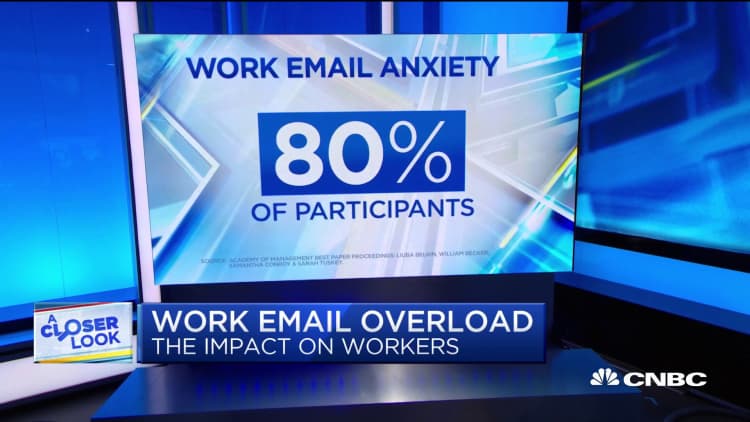Work email is a necessary evil in most offices — at best, it's a quick way to communicate and delegate tasks; at worst, it's a time-consuming productivity killer and source of never-ending stress. But limiting access to inboxes outside of office hours could do more harm than good, according to one new study.
Researchers from the University of Sussex say policies that restrict email access outside of the workday or on weekends could negatively impact workers' well-being, particularly those with "high levels of anxiety and neuroticism." The findings, published in the journal Computers in Human Behavior, indicate that positive or negative impact has to do with a worker's personality, as well as their goals when they approach work email.
Researchers identified four main reasons people logged into their inboxes while outside the office: to show concern for a coworker, to get work done effectively, to preserve their own well-being, or to have control over their work.
Those who check email to accomplish their own tasks effectively and have control over their workload are unlikely to welcome a blanket ban on email out of office hours, the researchers said. These types of workers may feel more stress thinking about accumulating email and coming back to a cluttered inbox. Instead, it's possible they feel more in control by addressing incoming mail at any hour of the day or on weekends.
"People need to deal with email in the way that suits their personality and their goal priorities in order to feel like they are adequately managing their workload," said Emma Russell, a lead researcher for the study, according to BBC News.
Some companies have implemented formal policies that restrict after-hours email activity. In 2012, Volkswagen modified email servers for employees in Germany so messages could only be routed between 7 a.m. and 6:15 p.m. (30 minutes before and after official working hours), with a complete restriction on weekends or when workers went on vacation.
Governments have even stepped in to help workers disconnect. Earlier in 2019, New York City proposed a "Right to Disconnect" bill that would make it illegal for private employers to require workers to check email during non-work hours. Similar legislation is in place in France, where some businesses are required to allow employees to negotiate after-hours email rules, with the option to disconnect at certain times without fear of professional repercussion.
Such policies don't come without skepticism, especially around how to enforce them. Even when workers are told they aren't expected to respond to work email after hours, they might not believe it. A Robert Half Technology survey found that while two-thirds of tech leaders say they could adhere to a ban on after-hours communications, 41% of their employees doubted their managers would follow such a rule. Managers at larger companies also feel more pressure to be connected at all times, the survey found.
Still, for better or for worse, workers are more connected than ever. A recent Adobe survey found the average American worker spends five hours a day attending to work and personal email. A little over half of workers said they check work email outside of office hours, especially while eating breakfast, commuting or while they're still in bed.
The researchers of the University of Sussex study say a one-size-fits-all policy isn't the best solution, but that clearly communicated guidelines at the individual level — between workers and their managers, for example — can help employees succeed.
Others say workers are more empowered if they're able to work on a flexible schedule, and one Robert Half survey suggests employees overwhelmingly want work perks that help them control their time. Flexible scheduling can be especially beneficial for women, who are often tasked with household and family responsibilities that aren't always accommodated by a 9-to-5 working schedule.
Like this story? Subscribe to CNBC Make It on YouTube!
Don't miss: 59% of millennials say they'd lie to their boss about not having Wi-Fi to avoid working on vacation



